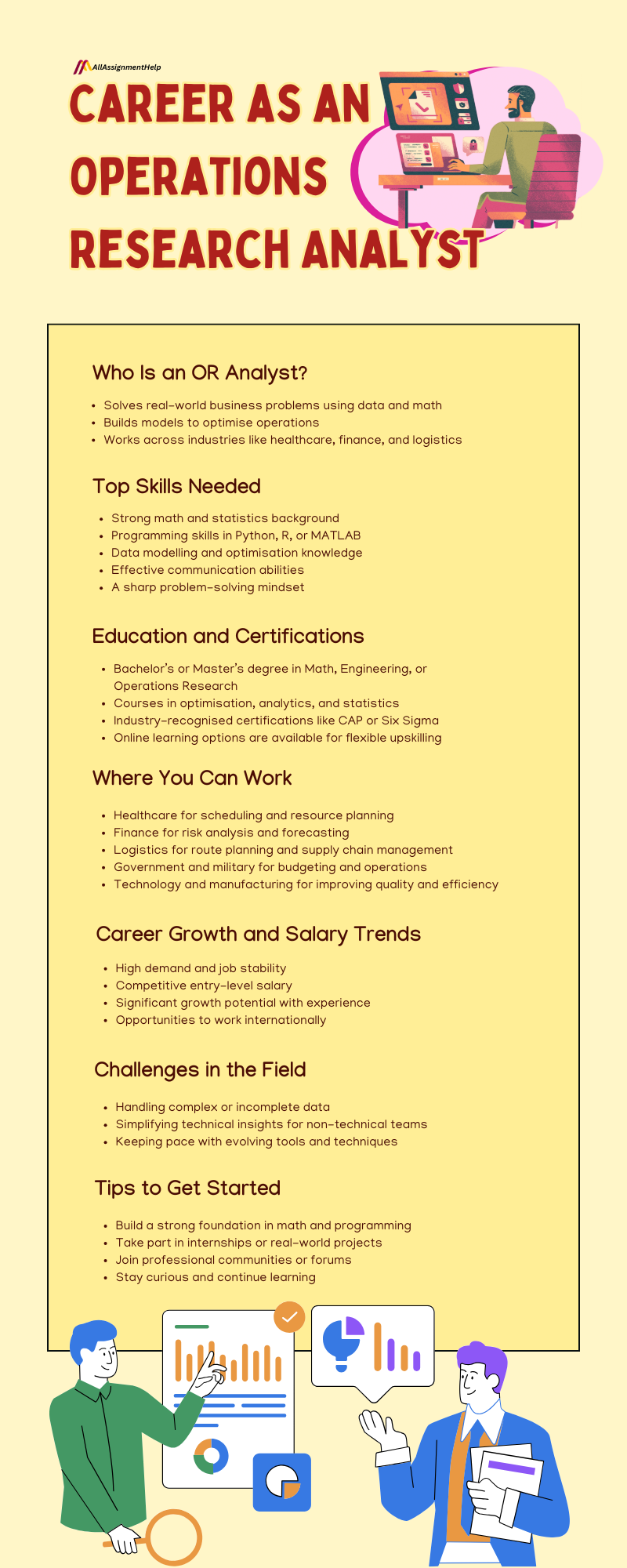Table of Contents
Have you ever wondered how big firms can make efficient business decisions, such as cutting operational costs without compromising on the quality of delivery? Well! And this is where operations research analysts step in. Their work is based on a combination of using math, data, and logic to help solve real business problems, such as reducing expenses, shortening delivery schedules, or streamlining patient care. From finance to logistics to even hospitals, you will find them giving their input every passing year, gaining more value. If you have a profile that loves to get into the data and find out how to make it work better, this may be a career that could suit you. This blog by All Assignment Help will examine the essential skills, job prospects, and growth in this area of study.
Who is an Operations Research Analyst?
An operations research analyst applies math, statistics, and analytical thinking to create the most efficient solutions for an organisation. They turn raw data into plans that can be used for anything from cost-cutting and efficiency boosting to logistical planning. Its focus areas include healthcare, supply chain, finance, and some other sectors. It helps in putting together logic and creativity that you can have in a career. Students who are aiming to step into this field know that they must understand concepts, and online assignment help can play a major role in helping students tackle the difficult subjects and the techniques used in the real world as well.
What is the Role of an Operations Research Analyst?
Operations research analysts are essential in assisting organisations to make better decisions.
- They can parse through data, look for trends and develop mathematical models to address real-world challenges.
- For example, aiding a delivery service in routing its vehicles in the best possible order, or helping a hospital manage staff schedules in a way that they can provide better treatment to patients.
- They are solution-driven, which may involve optimisation, forecasting or a cost analysis.
- Being a data analyst means exploring data tables, testing, and compiling results for team or management distribution.
- The project may require you to use some tools like Excel or Python or R, or sometimes MATLAB, depending upon the project.
It is one of those areas where tech meets business mindset. Also, this is a perfect field for students who love puzzles and solving problems. However, it can be tricky for students to focus on the program when they have so many other things to juggle. In those cases, getting help from online class help services can make a difference. The process becomes comparatively easier with additional assistance. Also, under appropriate guidance, analysts in the making can lay strong foundations with the confidence to solve complicated problems in any field.
Also read: How to Write a Cybersecurity Research Paper – The Ultimate Guide for 2025
Key Skills Required to Become an Operations Research Analyst
To succeed in your work as an operations research analyst, you will need a combination of technical skills, as well as various soft skills.
- A good grasp of math and statistics is a must. You will be dealing with data, creating models, and interpreting results, so you need to be at ease with the numbers.
- The second major area is programming background knowledge. Knowing software and tools like Python, R, MATLAB, and even higher Excel functions can help you perform your work in a better and accurate way.
- In addition, a lot of analysts use other software, such as SAS, Gurobi or CPLEX to solve some optimisation problems.
However, just technical skills are not sufficient. It would be best if you were also a leader and a creative thinker. Operations research analysts are frequently called upon to solve tricky problems without a simple answer. What makes a great analyst is the ability not just to break down problems and test ideas, but also to recommend a course of action.
- Communication matters too. You are frequently required to communicate your work to non-technical individuals and stakeholders.
- A clear and confident discussion of your results can make or break how your work is regarded.
If you are thinking of entering this field and have been having a hard time with some coursework or test preparations, then you must seek the right assistance. You can find a solution to your problems with searches like, Where can I find the right idea to do my online exam properly. The right guidance can increase your internet programming abilities.

Educational Path and Certifications to Be an Operations Research Analyst
Careers in operations research analysts typically require at least a bachelor’s degree in areas such as mathematics, statistics, engineering, computer science, or economics. These programs give the foundational analytics to comprehend complex issues and create logical solutions. Moreover, a master’s degree in Operations Research, Industrial Engineering, Data Science, or a related field can help you grow in the field.
Certifications can also add credibility to the journey. One of the options is the Certified Analytics Professional (CAP) certification. With these concepts in mind, you can start doing online courses on data analysis, optimisation modelling, and statistical tools.
If you are doing any of these degrees, it is completely understandable to feel lost at times. Challenging subjects such as linear programming and simulation modelling are difficult. This is where you need help with the assignment to relieve you of the burden. Whether it be a deep learning of a concept or a full-on case study, timely academic help helps you stay on line.
Also read: Best Education Research Topics for Students 2025
Industry Scope and Opportunities as an Operations Research Analyst
There are a variety of job opportunities available in different industries for this area of study. As each organisation needs to make more reasonable decisions based on only the data, the necessity for operations research analysts is growing continuously.
Logistics and transportation
The logistics and transportation industry is among the biggest sectors employing OR analysts. They help firms to plan delivery routes, manage inventories, and minimise shipping costs.
Healthcare
In the healthcare industry, analysts help facilitate better patient experience, optimise hospital assets, and schedule personnel more effectively.
Finance
Analysts in the OR field are also widely used by the finance sector to deal with risk, trend forecasting and portfolio optimisation. They help with production planning, quality assurance, and supply chain management in manufacturing.
Operations research analysts help decision-makers choose the best solutions to their resource allocation, emergency planning, and operations strategy. Additionally, with advanced analytics and data becoming the norm in business, the demand for individuals who can interpret these complex fields of data and turn them into actionable propositions is also rising. This is a versatile field; you can work in practically any sector and even change industries during your career.
So, whether it be international logistics difficulties or public service improvement, operations research lets you be part of the solution.
Career Growth and Salary Trends
A career as an operations research analyst is a good growth type of job with stability. With organisations increasingly using data as a strategy, the need for individuals with strong analytical skills and continuous improvement process skills is ever-increasing. This implies that the job is developing in countless fields, including logistics, financial solutions, clinical care, and innovation.
Sooner or later, analysts enter senior roles where they could lead teams and work on complex models that drive concrete business decisions. But those entry-level jobs require you to work on smaller projects on a guided basis. Ultimately, the path varies for most professionals, either operating as an operations manager, data scientist, or, eventually, chief analytics officer, depending on career path and preference.
Salary trends
The pay can be at a very competitive level. The entry-level package for an analyst is quite good. As your experience increases and skill set expands, so does the salary. Those who are higher paid are those who either have advanced degrees or related knowledge in optimisation, simulation, or machine learning.
One of the most important things in this field is to keep up to date with technology and keep learning. All in all, it is a fulfilling career for the problem solvers and for the people who want to contribute a measurable change in the real world.
Challenges in the Field of Operations Research
Though getting a job as an operations research analyst is a lucrative career, it has some drawbacks as well.
- A significant challenge is how to handle big, dirty, or incomplete data. Before they can even model, analysts need to clean and prepare data.
- Tackling abstract mathematical results with non-technical stakeholders is another challenge.
- Moreover, there are always new tools, programming languages, and analytic techniques being developed, making it a little scary to keep up.
Students looking to get into the field should not fear the difficulties of concepts and projects. However, if you still face challenges, you can get help with assignment writing by expert services.
Tips to Get Started in the Field
- If you are aiming to become an operations research analyst, start by getting comfortable with math, stats, and some programming.
- Tools like Python, R, and even good ol’ Excel can take you a long way if you start early.
- Try picking up a few courses in optimisation and modelling; they will lay the foundation.
- Do not just stick to theory; build small projects, play with data, or even create your case studies.
- Internships work wonders. It provides practical experience and demonstrates how the theories work in the practical world of business.
- Joining an online forum, professional group, just observing industry chats, etc., is also a great way to learn. You will grasp a great deal about practical problem-solving solutions.
In the end, this industry rewards those who can adapt, learn, and question things in a normal way.
Conclusion
If you are interested in solving real-world problems with logic, data, and creativity, then a career as an operations research analyst is a great fit. The field is loaded with opportunity; there are openings in almost every industry, and an ever-growing demand for critical thinkers who can make sense of data. You should start learning the skills that you will need if you want to go down this path. Also, look forward to it with the right mindset, and if your preparation is great for it, then you can enter this new-age job.
Frequently Asked Questions
Question: What is an operations research analyst, and what do they do?
Answer: An operations research analyst analyses data, uses mathematical models, and analytical tools to assist organisations in making better decisions. That allows them to interact with various departments, which ultimately results in effective problem-solving and efficiency.
Question: In which industries would operations research analysts be employed?
Answer: They are employed in the industries of logistics, healthcare, finance, manufacturing, and even government agencies. Their role is to dial in systems and optimise outcomes wherever data comes into play.
Question: What skills do you need to become an operations research analyst?
Answer: You need to have a solid background in math and analytical thinking. Your role will also require you to work with data. You must know some tools like Python, R or tooling similar to Excel-based modelling software.
Question: Is it worth pursuing a career as an OR analyst?
Answer: Yes, it pays good money, has high demands, and you will be able to work in many sub-industries.
